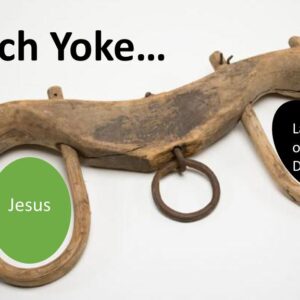THE EASY YOKE OF CHRIST VS. THE HEAVY YOKE OF TODAY’S ‘RELIGIOUS LEADERS’

First Reading: Isaiah 26:7-9,12,16-19
Responsorial Psalm: 101(102):13-21
Gospel Reading: Matthew 11:28-30
_______________________________________
Those who live in agricultural farmlands or settlements where animal husbandry is practiced could easily come to terms with the concept of Yoke. Literally, a yoke is said to be understood as a wooden beam normally used between a pair of oxen or other animals to enable them to pull together on a load when working in pairs; or a wooden bar that is fastened over the necks of two animals, especially cattle, and connected to the vehicle or load that they are pulling. Fastened on their necks, the animals are able to pull the load which is often heavy. Hearing Christ talking about those who labour and are overburdened, and offering to grant them rest through His easy yoke in today’s gospel, speaks of His initiative in redeeming us from the yoke and burden of sin and offering us salvation and new life through His law of love.
Christ was very conversant with his milieu and the attitude of the people towards religion. He noticed that his people were laden with a very heavy yoke of the law by the religious authorities. The yoke of the law “fixed on the neck of the people” was too heavy for the people to bear such that they were unable to live out the demands of the law. This was because the Pharisees, teachers of the law, and Scribes took the gentle yoke of the Law of Moses (Decalogue) and multiplied it to 613; with 365 prohibitions and 248 obligations. This became a heavy yoke and burden for the people to bear. They found it difficult to live out the law as they ought to. They became oppressed and victimized. Nevertheless, Christ tells them to come to him that the law (yoke) he gives is very light and easy; and that is the yoke of love, summarizing all the commandments into 2 – the love of God and the love of the neighbour (see. Matt. 22:37). Here, Jesus is understood as the New Moses, and in fact, one greater than Moses. Recall that in Numbers 12:3, Moses is said to be the meekest man on earth and in giving Israel the Law of God, he laid upon them the gentle yoke of the Law. Thus, in giving them the New Law enshrined in love, Jesus speaks of himself as “meek and humble of heart.” Needless to say, the yoke of Christ is that of love. Similarly, in the first reading, the Prophet Isaiah invites his listeners who were distressed under the misery of oppression; better still, under the heavy yoke of punishment due to their sins, to trust in the Lord always, for He is faithful to His promises and attentive to their conditions.
Unfortunately, like the Pharisees and Scribes of Jesus’ days, many charlatans and miscreants who claim to be ‘religious leaders’ today continue to lay upon their members a heavy and terrible yoke such that they find it difficult to serve God freely – ranging from the yoke of compulsory payment of tithes to that of first fruits, seed sowing, and the numerous offerings, etc., such that if they don’t make these payments, they would be termed as children of the devil and candidates of hell. The religious leaders have failed to preach love, which is the essence of the gospel but are interested in the financial benefits from the yoke (burden and oppression) they lay on the people of God. Some of these ‘men of God’ even go as far as frustrating the efforts of their members out of selfishness and make them regret being Christians. As a result, many Christians decide to remain at home instead of going to the Church and experiencing the heavy yoke of religion.
Dearest friends in Christ, Christ has called each and every one of us to look beyond these ‘heavy yokes’ of religion and focus on Him who is ‘meek and humble of heart,’ and that it is only by trusting in the saving power of His Word and the Sacraments that our souls can find rest; as St. Augustine says: “You have made us for yourself, O Lord, and our hearts are restless until they rest in You.” Thus, “in God alone is our souls at rest” (Ps. 62:5), and not in the religious leaders who scandalize their members by placing upon them the heavy yoke of religion as against the easy and gentle yoke of Christ.
Shalom!
© Fr. Chinaka Justin Mbaeri, OSJ
Paroquia Nossa Senhora de Fatima, Vila Sabrina, São Paulo, Brazil
nozickcjoe@gmail.com / fadacjay@gmail.com

